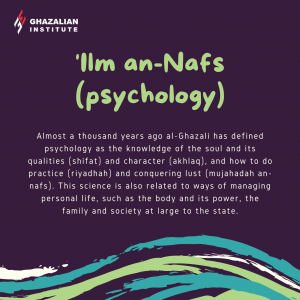 Ghazalian Psychology as Islamic Psychology
Ghazalian Psychology as Islamic Psychology
There are not many people who are aware that al-Ghazali was an expert in psychology. Malik Badri called him the pioneer of spiritual counselling, meanwhile Usman Najati consider al-Ghazali’s concept was way ahead nine centuries earlier than the therapists from the school of modern psychoanalysis and Cognitive Behavior Therapy.
If it is viewed from the modern psychology of personality, with its five criteria, then al-Ghazali’s explanation fulfils those five criteria, such as the purpose of the psychology of personality is (1) to observe man scientifically, (2) to develop systematic theories, (3) verifiable, (4) comprehensive, and (5) to translate the theories into practical applications.
Almost a thousand years ago al-Ghazali has defined psychology as the knowledge of the soul and its qualities (shifat) and character (akhlaq), and how to practice (riyadhah) and conquering lust (mujahadah an-nafs). This science is also related to ways of managing personal life, such as the body and its power, the family and society at large to the state.
Al-Ghazali had been observing man scientifically. It started when he was concerned regarding his society which suffered moral decadence, deviation of behaviour, and mental and spiritual diseases. Al-Ghazali felt responsible to perform moral correction and provide therapy for mental and behavioural diseases. From his observation and deep analysis, al-Ghazali discovered the causes of mental diseases and found the pattern of how behaviour is formed. It is formed in a manner that: knowledge (‘ilm) possessed by someone will bring the mental states (hal), and it further brings forth behaviour (‘amal). After finding its pattern, he continues and tests it by making a prognosis to find the right and effective method in the form of spiritual practices (riyadhah) and struggle (mujahadah).
Then, what is a character (akhlaq) and what is its relation to personality? To help our understanding of character, al-Ghazali provides an example of giving alms. Character is not merely action because many people have the character of generosity but did not give alms due to the absence of wealth or other obstacles. There is also a person who has the character of stingy but he gives due to riya’ or showing off to people in seeking acknowledgements. A character may be defined as the soul’s state with its internal form from which an action comes forth lightly and easily.
Based on al-Ghazali’s example in explaining character (akhlaq), there are similarities with the definition stated by Gordon W. Allport who defined personality as a thing and doing something. Personality is what lies behind specific actions and it is within the individual. The action is generous but behind it, there is a motivation to be seen or acknowledged by other people (riya’). Its internal form is riya’ and its behavioural form is generosity. Raymond B. Cattell called the behavioural form or generosity the surface trait and the internal form or riya’ as the source trait. For the general people, the surface traits may be felt more correct and more meaningful in comparison with the source traits. It is because the surface traits are suited to generalizations which can be concluded based on a simple observation. Nevertheless, in the end, it is the source traits which are more useful in explaining behaviour, the problems of development and the dynamics of personality.
If personality is what lies behind the specific actions and within the individual and it is evaluated as good or bad, then Allport called it character. It is the definition of the evaluated personality which is in line with the view of Islam because one’s behaviour is not separated from values. It is bounded by morality such as good and bad and brings reward or sin. So, the simple difference between personality and character is that when personality is evaluated or judged then it is called character. On the other hand, when a character is not being judged then it is called personality. Based on Allport’s definitions, akhlaq is a character that is a personality which is being evaluated. It is similar to al-Ghazali’s definition of akhlaq as the permanent condition of the soul, which is internal, and from which all actions come forth lightly and easily without any need for deep thinking. If it brings forth good or praiseworthy actions according to the intellect and religion, it is called good character (al-akhlaq al-karimah), and if it brings about blameworthy actions, it is called bad character (al-akhlaq al-radzilah).
Al-Ghazali’s concept of character, if we view it from Alfred Adler’s perspective, fulfils the principles in the psychology of personality. Psychology of personality is a branch of psychology which has two basic principles: first, the psychology of personality discusses the structures of human personality as a totality. This is discussed by al-Ghazali in a detailed manner regarding the faculties of the soul (quwwah an-nafs) which are formed through the structure of character which is structured in the faculties or powers of syahwat, ghadab, ‘aql and ‘adl. Second, the psychology of personality elaborates on normal individual behaviour. It is a study which is based on healthy behaviour, not sick one. This concept is also discussed by al-Ghazali, and it is even more complete by the explanation of the concept of healthy soul (qalbun salim), sick soul (qalbun maridh), and dead soul (qalbun mayit). This is why al-Ghazali is properly considered an expert in the psychology of personality, or, to be precise, an expert in the psychology of character (akhlaq).
The current psychological studies have shifted from its real object of study, which is the soul. Psychology considers the soul partially and focuses its research on the soul’s definition as something material in nature, and then detaches itself from the control of religion, detaches itself from the metaphysical relation which governs man’s intellect and behaviour. Psychology no longer views man as something that consists of body and spirit. Allah says in the Qur’an, “Do you not see that Allah has subjected to your (use) all things in the heavens and earth, and has made his bounties flow to you exceeding measure, (both) seen and unseen? Yet there are among men those who dispute about Allah, without knowledge and without guidance, and without a Book to enlighten them! (Luqman [31]: 20).
The shift of the framework was the result of the secularized concept of the intellect for a very long time. The Western culture considers knowledge as a collection of material things such that to have knowledge it is only through the approaches of experience, attention, studies, and examinations by using the senses. According to the West, the intellect is a tool to acquire every sensible thing whereas the intellect could not arrive at knowledge about spiritual things.
In al-Ghazali’s view, the intellect has two aspects, the one which is facing upwards is called the theoretical intellect (al-‘aql al–‘alimah), and the one which is facing downwards is called the practical intellect (al-‘aql al-‘amilah). The theoretical intellect (al-‘aql al-‘alimah) is the intellect to understand something abstract, pure, and things which do not appear in the material world such as God, spirit, angels, the Hereafter and everything from the divine realm. Whereas, the practical intellect (al-‘aql al-‘amilah) is the intellect which perceives meanings from matter through the retentive-recollective faculties and becomes the basis for the movement of man’s body (Najati, 2002). According to Ibn Sina, the practical intellect is in the area of the brain.
Secularization separates the material world from the spiritual and rejects anything of transcendent nature from the aspect of life. According to them, to achieve prosperity and happiness does not necessarily require knowing and believing something which is ghayb. The consequence of denying the ghayb aspect in life means discarding the concept of belief which is the foundation of life as a Muslim, such as belief in Allah, the angels, the Books, the Prophets, the Hereafter, and divine decree. The concept of prosperity or well-being is not separated from Allah’s guidance which is conveyed in His Books and the saying of His Prophets and Messengers.
in ghazalian psychology, the concept of well-being cannot be separated from the spiritual dimension. According to al-Ghazali, well-being is the achievement of goodness (maslahah). As for the maslahah itself, it means the observance of the objectives of syari’ah (maqashid syari’ah) which consists of six fundamental objectives: the observance of religion (hifdz ad-din), the observance of soul (hifdz an-nafs), the observance of intellect (hifdz al-‘aql), the observance of wealth (hifdz al-maal), and the observance of genealogy (hifdz an-nasl) as well as the observance of honour (hifdz al-irdh). And man cannot experience happiness and peace if the six objectives were not maintained and observed.
Salam.
Ricky Firmansyah
Founder of Ghazalian Psychology
